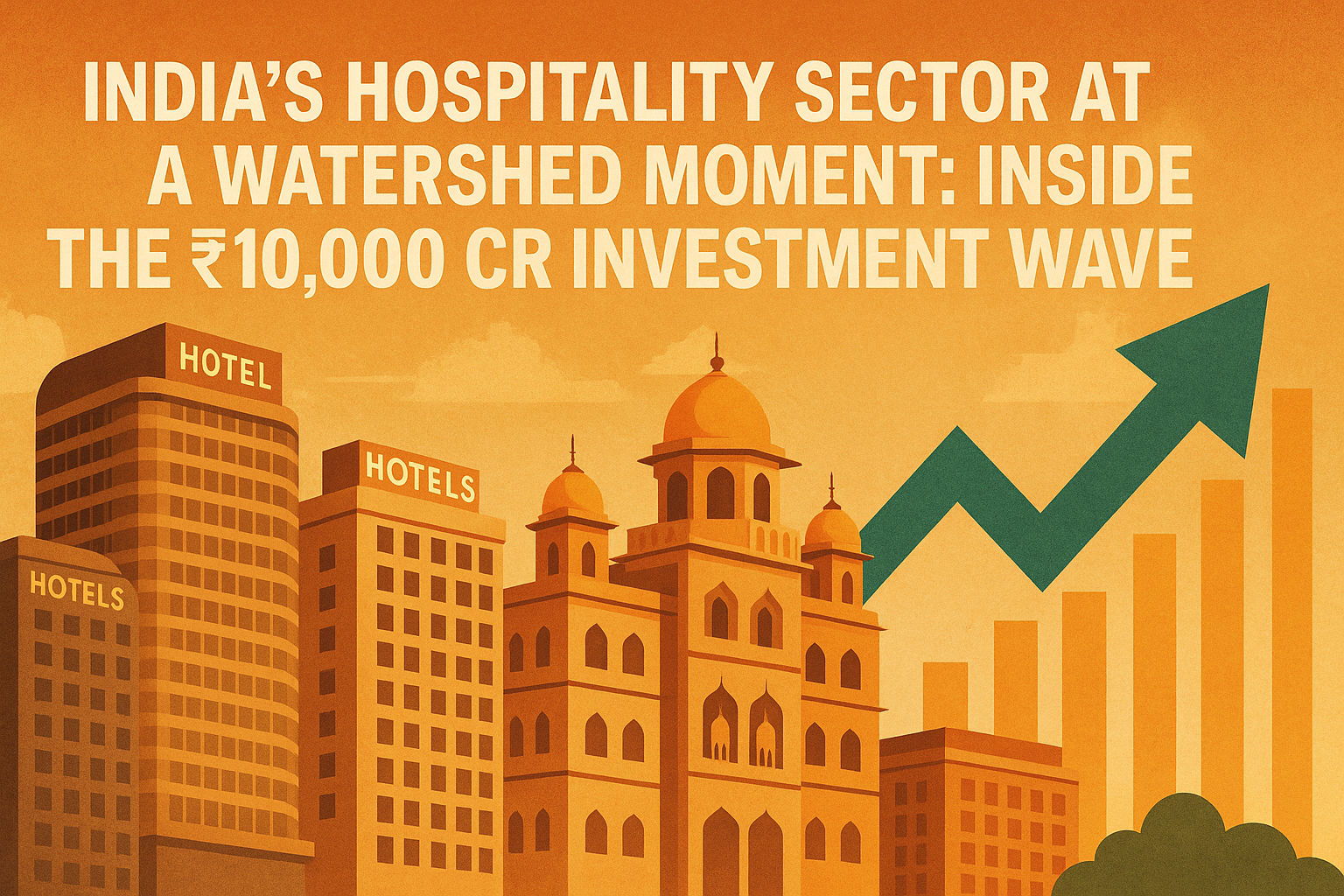India’s hospitality industry is undergoing a paradigm shift. A confluence of IPOs, strategic acquisitions, and bold capital infusion — crossing the ₹10,000 crore mark since 2023 — is reshaping the sector from the ground up. More than mere expansion, this is a systemic recalibration. Here’s an in-depth look at how legacy giants and new-age hotel chains are transforming India’s travel landscape for the next decade.
A Funding Boom Breathing New Life into Hospitality
Since 2023, Indian hotel chains have raised over ₹10,000 crore through IPOs, QIPs, and internal funding. This capital surge marks a definitive shift in investor sentiment — from caution to confidence.
| Company | Year | Amount Raised (₹ cr) | Details |
|---|---|---|---|
| Schloss Bangalore (Leela) | 2025 | 3,500 | ₹1,575 crore via anchor investors; rest via IPO |
| Ventive Hospitality | 2025 | 2,000 | DRHP filed; IPO pending |
| Chalet Hotels | 2024 | 1,000 | Raised via QIP |
| Samhi Hotels | 2023 | 1,370 | IPO completed in September |
| Juniper Hotels | 2024 | 1,800 | IPO completed in February |
| Park Hotels (Apeejay Surrendra) | 2025 | 800 | DRHP filed in 2024 |
These figures reflect a robust appetite from both public markets and private equity. Experts believe the trend is not a bubble, but a sign of deeper industry formalisation and long-term growth strategies.
Repositioning for Growth: Metro to Micro-Market Expansion
The investment wave is not limited to India’s top metros. Hotel groups are now turning to tier II and III cities, especially those with growing demand for leisure and spiritual tourism.
Radisson Hotel Group, for instance, is moving decisively into markets like Ujjain, Ayodhya, and Dhanbad. “This isn’t just expansion. It’s recalibration,” says Nikhil Sharma, COO – South Asia, Radisson Hotel Group. With greenfield development harder in metros, companies are exploring conversions, leasing models, and asset-light strategies.
Asset-Light, Spirit-Rich: New Models Take the Lead
Emerging hotel chains are challenging legacy models with nimble, capital-efficient strategies:
- Alivaa Hotels (backed by Ananta Capital): Using leases to expand, already operating 8 of 12 signed hotels in under a year.
- Araiya, Brij, and Cygnett Hotels: Targeting tier II/III cities using franchising and management contracts.
- Hotel Polo Towers and Pride Hotels: Reviving IPO ambitions, signalling growing ambition across the board.
India’s current inventory of just 200,000 rooms is dwarfed by China’s 7 million. The vacuum signals explosive opportunity — especially as domestic travel surges among a population of over 200 million consumers.
Consolidation: M&A Gains Momentum
Strategic mergers and acquisitions are gaining pace:
- Marriott acquired a minority stake in Concept Hospitality (The Fern) to launch a budget-friendly brand — a rare equity play by the global giant.
- Larisa Hotels merged with AM Hotels in February 2025 to boost reach in resort markets.
- Adani Group eyes hotel entry via Jaiprakash Associates’ distressed asset acquisition — a move that could add six properties overnight.
This trend allows newly public companies to scale inorganically, backed by fresh IPO capital. Experts believe the pace of such consolidation will only intensify.
Investor Confidence, IPO Momentum
A growing number of companies are lining up to list. These include not just established players like ITC Hotels and Brigade, but also newer entrants eager to capitalise on market tailwinds.
With domestic tourism booming — and room rates climbing due to demand-supply imbalance — the timing is ideal. According to Mandeep Lamba, CEO at HVS Anarock, the shortage of leisure hotels despite surging travel interest is keeping average room rates high, especially in smaller cities and spiritual destinations.
India’s Hospitality Sector: The Next Five Years
Over the next 3–5 years, India is set to emerge as one of the world’s most vibrant hotel markets. The reasons are clear:
- Demographics: Rising income and aspirational travel among the middle class.
- Market Opportunity: Underpenetrated supply with millions of new consumers.
- Capital Access: IPOs and private equity unlocking growth.
- Operational Flexibility: Shift to asset-light, hybrid models.
- Strategic Consolidation: M&A as a tool for rapid expansion.
Radisson’s Sharma puts it succinctly: “Our goal is not just to grow in numbers, but to create differentiated value in every destination we serve.”
Conclusion: A Structural Transformation in Motion
The current wave of investment is more than a financial milestone — it is a signal of maturity, ambition, and opportunity. India’s hospitality sector is no longer playing catch-up. It is now innovating, consolidating, and expanding into a future that is equal parts profitable and transformative. For investors, operators, and travellers alike, this could be the beginning of a golden age.
Feel free to share your experiences and insights in the comments below. Let’s continue the conversation and grow together as a community of traders and analysts.
By sharing this experience and insights, I hope to contribute to the collective knowledge of our professional community, encouraging a culture of strategic thinking and informed decision-making.
As always, thorough research and risk management are crucial. The dynamic nature of financial markets demands vigilance, agility, and a deep understanding of the tools at your disposal. Here’s to profitable trading and navigating the election season with confidence!
Ready to stay ahead of market trends and make informed investment decisions? Follow our page for more insights and updates on the latest in the financial world!
For a free online stock market training by Yogeshwar Vashishtha (M.Tech IIT) this Saturday from 11 am – 1 pm, please sign up with https://pathfinderstrainings.in/training/freetrainings.aspx
Experience profits with my winning algo strategies – get a free one-month trial with ₹15 lakh capital! – https://terminal.algofinders.com/algo-terminal
Disclaimer
This article should not be interpreted as investment advice. For any investment decisions, consult a reputable financial advisor. The author and publisher are not responsible for any losses incurred by investors or traders based on the information provided.


